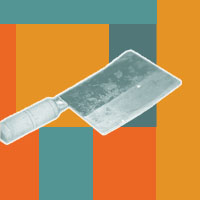Each Friday, the Heavy Table presents a new installment of Knife Skills, a culinary novel presented piece by piece as it’s written. If you’re uncomfortable with salty language, please be aware that characters regularly use words and phrases unacceptable in polite conversation. In the author’s imagination, some members of the food service industry have a tendency to swear. For previous and subsequent installments, visit the Heavy Table’s Fiction directory.
One chilly morning before work, Robert T. Robertson ducked into a local diner for breakfast. The place was rundown and crowded in a manner that made him instantly comfortable, and he ordered a breakfast sandwich: bacon, egg, cheddar cheese, English muffin. He chewed away at it slowly, mulling over the world news section of the Journal and sucking down a smooth and mellow cup of coffee. Bad things were happening to women in Afghanistan. Slowly, as he re-read a paragraph about an elderly suicide bomber who targeted a nursery school for girls, it dawned upon him that the cheddar was good. It tasted aged. The bacon, it occurred to him, was perfectly crispy and applewood smoked. He looked back at the menu: It read “Breakfast sandwich, bacon, egg, cheddar cheese, English muffin or bagel, $5.25.” Totally free of pretense. He kept chewing. The English muffin was perfectly toasted and seemed, upon closer inspection, to be homemade; the egg’s warm yolk covered and was contained by the cheese and bacon. In short, it was a balanced egg sandwich, and he finished every crumb, tucking the last half-bite into his mouth with his pinky.
“Did you make this?” he asked the guy at the griddle. The cook looked like trumpet player in a ska band, all sideburns, tattoo, and bulky working class energy.
“Yep,” said the guy, flipping a pancake.
“This was a damn good sandwich,” said Robertson. “This was goddamn great.”
“Thanks,” said the cook, refilling Robertson’s coffee, and the coffee of the woman sitting to Robertson’s right.
“What’s your training?”
“Oh, cooking wise? Uh, I’ve been around. Cooked for The Red Tower for awhile, if you’ve heard of that.”
 The Red Tower was the best restaurant in Philadelphia. Not just best by reputation, but best to those who knew food, and it had been consistent since the day it had opened. Its head chef, Dale Gorenfeld, was known as an obsessive taskmaster with emotional problems, a couple dozen strong connections to top kitchens in France, Japan and New Amsterdam and a flair for great classic food.
The Red Tower was the best restaurant in Philadelphia. Not just best by reputation, but best to those who knew food, and it had been consistent since the day it had opened. Its head chef, Dale Gorenfeld, was known as an obsessive taskmaster with emotional problems, a couple dozen strong connections to top kitchens in France, Japan and New Amsterdam and a flair for great classic food.
“The Red Tower in Philadelphia?” asked Robertson, incredulously.
“Yep,” said the cook.
“I cook for Jim Thursday’s new place,” said Robertson. “We should talk. When’s your shift over?”
A couple hours later, Robertson ducked into a Starbucks around the corner from Kami. The cook was there, drinking a bottled juice and reading a copy of People Magazine.
“Hey,” said Robertson, shaking the man’s hand. “Robert Robertson.”
“Matt Barber,” said the chef. “Appreciate the time.”
“Sure, no worries,” said Robertson. “If you don’t mind me asking, what are you doing line cooking at a diner?”
Barber winced. “Listen, I appreciate that you’re trying to help… well, let me put it this way. I signed up for the wrong team at one point in my career. I crossed Dale, and Dale… the fucker’s not famous for letting bygones be bygones.”
“What do you mean?”
 “Asshole’s tracked me from restaurant to restaurant, and gotten me fired a half dozen times. Obviously, I can work at a diner. That seems to be fine. But I move up to something like a gastropub, a few weeks go by, and that’s all. I’m out. Sometimes the owner hints at some lucrative quid pro quo, sometimes they seem to be frightened, sometimes they’re just pissed off at me, once or twice they’ve been sad to see me go. But I get the boot.”
“Asshole’s tracked me from restaurant to restaurant, and gotten me fired a half dozen times. Obviously, I can work at a diner. That seems to be fine. But I move up to something like a gastropub, a few weeks go by, and that’s all. I’m out. Sometimes the owner hints at some lucrative quid pro quo, sometimes they seem to be frightened, sometimes they’re just pissed off at me, once or twice they’ve been sad to see me go. But I get the boot.”
“Jesus. That’s terrible,” said Robertson, with real feeling. “What’s the story?”
“I left Dale’s joint to work for a new GastroCom joint in New Amsterdam. That was just about three weeks before they imploded. Anyway, it would’ve been one thing to leave The Red Tower and go to, I don’t know, somewhere top flight. I could’ve. But the GastroCom money was insane.”
“My condolences,” said Robertson, his demeanor suddenly frosty.
“Yeah… anyway, I threw it away, and now I’m fucked.” He paused for a second, staring at the tiled floor. The ambient chatter rose and fell. “Gorenfeld’s really taken an interest in me,” he said.
Robertson fixed Barber with a steady stare. “Let me get this straight, though — you came to his restaurant — one of the 10 best in the States, pretty easily one of the 25 or 30 best in the world, and he trained you up, he paid you OK, he treated you OK, and you left him for a paycheck.”
“Yeah,” said Barber, his voice shaking a bit.
“You know,” said Robertson, “There are rules, and then there’s what’s right and wrong.”
“That’s bullshit,” said Barber, the pitch of his voice rising. “I know guys who stole from Gorenfeld after hours, who fucked their girlfriends in the walk-in while they were supposed to be on prep duty, who…”
“Who broke the rules, right,” said Robertson. “The difference is that he thinks you did something wrong by ditching out for a paycheck. It’s not a trivial thing. If it’s just dollars, and not an organic philosophical or even personality problem…”
“Yeah, but where I am now — It feels like shit. This can’t possibly be fair, man. All your life, you get trained up to do something tough. You can do it, and it isn’t even a thing. It’s just what you’re made to do, right? Then because some asshole decides that he hates you, you have to throttle down to half the speed you’re built to handle, and you sit there thinking — what the hell? Am I not economically useful? What the fuck am I doing working 40 hours a week making pancakes and sausages for office assistants and subway employees? I mean, fuck, those people deserve good food, too. Don’t get me wrong. But I can cook the hell out of some difficult stuff. That’s fun for me. That’s what I do.” Barber clenched and unclenched his fists, still looking at the floor.
“Gorenfeld’s got a vendetta against you, man,” said Robertson. “I can’t say that I would have taken it as far as he has, but it makes a certain amount of sense. Look, good luck to you. If things change… hell, if a year goes by and you’re still jammed up… let me know. I can’t do anything for you right now, though.”
Barber didn’t reply. He just looked, with cold and angry eyes, out the window of the cafe.
Robertson stood up and left.
[First Part] << Previous Part | Next Part >> [Last Part]

